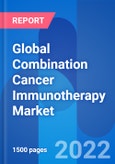In recent years, cancer immunotherapy has emerged as an appealing strategy for overcoming the limitations of conventional therapies. The novel therapy aims to harness the ability of the immune system to recognize, target, and destroy cancer cells. Cancer immunotherapy now encompasses several therapeutic agents including monoclonal antibodies, immune checkpoint inhibitors, vaccines, antibody-drug conjugates, and others. All these novel approaches have their distinct target and mechanism of action. Although immunotherapies have shown significant improvement in the clinical outcomes of cancer patients, these are associated with several limitations. Tumor heterogeneity and the development of resistance are the major challenges to current immunotherapeutic approaches.
This has pushed the research studies to evaluate immunotherapy in combination with other cancer-targeting approaches including chemotherapy, radiotherapy, targeted drugs, and other immunotherapeutic approaches. Combination therapy aims to combine two or more drugs that have a synergistic mechanism of action in targeting the disease. In comparison to monotherapy, combinational therapy aims to have a more enhanced and additive effect in the targeting of cancer cells. Further, it also has the potential to overcome drug resistance and enhance the overall survival rate in cancer patients. The conferred advantages associated with combinational therapies have drawn the interest of several pharmaceutical giants to invest in this segment.
Currently, several drugs such as Opdivo, Yervoy, Bevacizumab, and others have gained approval as combinational immunotherapy for the management of cancer cells In 2022, US FDA has granted approval to the fixed-dose combination of relatlimab (LAG-3 inhibitor) plus nivolumab for the treatment of adult and pediatric patients who are 12 years of age or older and who have unresectable or metastatic melanoma. The novel combination has shown manageable safety with no new or unexpected safety signals. The combination is sold under the trade name Opdualag and is marketed by Bristol Myers Squibb.
In the last few years, pharmaceutical companies have begun to embrace a more collaborative way of working to mitigate the obstacles of drug development. The manufacturers of antibody-drug conjugates are increasingly collaborating or partnering with other companies to share technology, resources, and product knowledge, and expand the business. For instance, Gilead Sciences entered into two clinical trial collaboration and supply agreements with Merck to evaluate the combination of Trodelvy and Keytruda in first-line metastatic non-small cell lung cancer. Additionally, the companies recently established an agreement whereby Gilead will sponsor a phase-II signal seeking study evaluating combinations that include pembrolizumab in first-line non-small cell lung cancer.
Triple combinational therapy is also gaining considerable momentum in the market. However, it is mainly confined to the initial stages of clinical development. For instance, Zenith Pharmaceutical in collaboration with Bristol Myers Squibb is conducting a clinical trial that is evaluating the triple combination of ZEN-3694 (BET inhibitor), Opdio, and Yervoy. The trial will be conducted by NCI-funded investigators and will evaluate the safety and activity of this combination in patients with solid tumors that have become resistant to other therapies. Apart from this, triple combinational therapy of PD-1/PD-L1, BRAF, and MEK inhibitors is also ongoing in multiple myeloma patients.
As per report findings, the global combinational immunotherapy market is expected to surpass US$ 15 Billion by 2028. This is mainly attributed to the rising geriatric population and a surge in the prevalence of various cancers. This possesses high medical needs for the development of targeted therapies in its management. In addition, rising investments by pharmaceutical companies due to the promising response of combinational immunotherapy is also driving the growth of the market. The major players in the global combinational immunotherapy market include Amgen, Roche, Macrogenics, Mylan, Seagen, AstraZeneca, Gilead Sciences, GlaxoSmithKline, and others.
Report Highlights:
- Global and Regional Combination Cancer Immunotherapy Market Insight Till 2028
- Combination Cancer Immunotherapy Market Opportunity: > USD 15 Billion
- Combination Cancer Immunotherapy Market By 15 Different Cancers
- Insight On Clinically and Commercially Approved Cancer Immunotherapy Combinations
- Patent, Price, and Dosage Analysis On Approved Combination Drugs
- Global and Regional Sales Insights On Approved Combination Drugs Till 2028
- Insight on 600 Combination Cancer Immunotherapy Drugs In Clinical Trials
- Insight on 45 Combination Cancer Immunotherapy Drugs Commercially Approved In Market
- Clinical Trials and Patent Insight By Company, Country, Indication, and Phase
Table of Contents
Companies Mentioned (Partial List)
A selection of companies mentioned in this report includes, but is not limited to:
- Abbvie
- Agenus
- Akeso Pharmaceutical
- Amgen
- Arbutus Biopharma
- Astrazeneca
- Aum Bioscience
- Beigene
- Biontech
- Bristol Myers Squibb
- Candel Therapeutics
- Eli Lilly
- Elicio Therapeutics
- Fate Therapeutics
- GlaxoSmithKline
- Harpoon Therapeutics
- Immutep
- Imugene
- Intensity Therapeutics
- Janssen Pharmaceuticals
- Merck
- Morphosys
- Novartis
- Novocure
- Nykode Therapeutics
- Ono Pharmaceutical
- Oxford Biotherapeutics
- Pfizer
- Qurient
- Regeneron
- Roche
- Sanofi
- Seagen
- Shanghai Junshi Biosciences
- Takeda Pharmaceuticals








